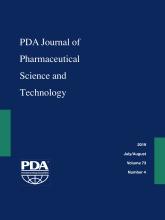Abstract
In our previously published work, we reported rapid polysorbate 80 (PS80) oxidation in a histidine buffer after brief exposure to stainless steel and the ability of citrate and EDTA to prevent this oxidation. The focus of our current study was to mechanistically understand PS80 oxidation by studying the impacts of temperature, light, and stainless steel and the role of citrate and EDTA. Additionally, PS80 oxidation was studied in three different buffer systems: histidine, citrate, and phosphate. When the PS80-containing buffers in glass containers were exposed to the elevated temperature of 50°C, no PS80 oxidation was observed in either the histidine or the citrate buffer systems after 30 days; however, PS80 oxidation was observed in the phosphate buffer system within 14 days. These results demonstrated that temperature does not initiate PS80 oxidation in the histidine or the citrate buffer systems, but it may be a factor in the phosphate buffer system. When the three buffer systems containing PS80 were exposed to 20%, 50%, or 100% ICH Q1B light conditions and subsequently incubated in the dark at 50°C, the PS80 in the phosphate buffer system underwent oxidation within 7 days, whereas the PS80 in the histidine and the citrate buffer systems showed oxidation products only after 14 and 35 days, respectively. PS80 in the phosphate buffer system seemed to be the most vulnerable to light as PS80 in both the histidine and the citrate buffer systems underwent oxidation to a lesser extent, with faster oxidation occurring in the histidine buffer system than in the citrate buffer system. Finally, the ability of citrate and EDTA to act as not only chelators but also radical quenchers/scavengers was demonstrated when a metal ion, Fe2+, was spiked into the histidine buffer containing PS80. While radicals could not be unambiguously identified by NMR or EPR, the observation of PS80 oxidation products indicated their presence.
LAY ABSTRACT: In our previously published work, we reported rapid polysorbate 80 (PS80) oxidation in a histidine buffer after brief exposure to stainless steel and the ability of citrate and EDTA to prevent this oxidation. The focus of our current study was to mechanistically understand PS80 oxidation by studying the impacts of temperature, light, and stainless steel and the role of citrate and EDTA. Additionally, PS80 oxidation was studied in three different buffer systems: histidine, citrate, and phosphate. The temperature study demonstrated that PS80 oxidation in the histidine or the citrate buffer systems is not initiated by temperature, but may be a factor in the phosphate buffer system. PS80 in the phosphate buffer system seemed to be the most vulnerable to light, as PS80 in both the histidine and the citrate buffer systems underwent oxidation at a lower level, with the histidine buffer system showing more rapid oxidation than the citrate buffer system. Finally, the ability of citrate and EDTA to act as not only chelators but also radical quenchers/scavengers was demonstrated when a metal ion, Fe2+, was spiked into the histidine buffer containing PS80. While neither NMR nor EPR could definitively identify the presence of free radicals, the observation of PS80 oxidation products indicates that they were present.
- © PDA, Inc. 2019
PDA members receive access to all articles published in the current year and previous volume year. Institutional subscribers received access to all content. Log in below to receive access to this article if you are either of these.
If you are neither or you are a PDA member trying to access an article outside of your membership license, then you must purchase access to this article (below). If you do not have a username or password for JPST, you will be required to create an account prior to purchasing.
Full issue PDFs are for PDA members only.
Note to pda.org users
The PDA and PDA bookstore websites (www.pda.org and www.pda.org/bookstore) are separate websites from the PDA JPST website. When you first join PDA, your initial UserID and Password are sent to HighWirePress to create your PDA JPST account. Subsequent UserrID and Password changes required at the PDA websites will not pass on to PDA JPST and vice versa. If you forget your PDA JPST UserID and/or Password, you can request help to retrieve UserID and reset Password below.






